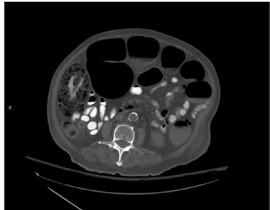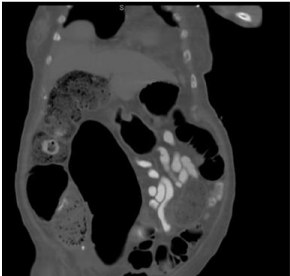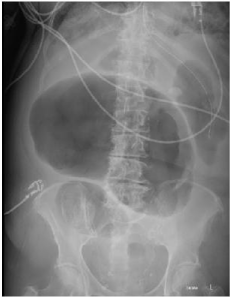
Case Report
Austin J Clin Case Rep. 2017; 4(2): 1116.
Fecaloma Resulting in Bowel Obstruction and Death: Case Report and Review of Literature
Ansari JA, Anwar S and Musleh M*
Department of Gastroenterology, Wright State University, USA
*Corresponding author: Musleh M, Department of Gastroenterology, Wright State University, 1 Wyoming St, Dayton oh 45409, USA
Received: January 03, 2017; Accepted: April 03, 2017; Published: April 10, 2017
Abstract
Fecaloma is a mass of accumulated fecal matter being impacted most commonly in the sigmoid colon and rectum. It is usually seen in patients with chronic constipation, Chagus disease, and psychiatric illness. Patient’s presents can present with non-specific complaints. Conservative management includes laxatives, bowel rest and enema but surgical and endoscopic intervention may be required in some cases. We report a case of fecaloma which led to bowel obstruction. Patient failed both conservative and endoscopic treatment and ultimately passed away. Early diagnosis and management can potentially have a favorable outcome.
Keywords: Fecaloma; Intestinal obstruction; Abdominal pain
Introduction
The first case of Fecaloma was described in 1967 [1,2]. It is defined as a mass of hardened feces most commonly accumulated in the colon or rectum [1,3,4]. Fecaloma has been described in the literature before. It results from accumulation of fecal material that forms a mass separate from other bowel contents [5,6]. It has been described in patients with Hirschsprung’s disease, idiopathic chronic constipation and psychiatric patients [1,7]. Our Case has several teaching points and highlights the importance of early detection of these patients which could potentially result in a favorable outcome.
Case Presentation
A 92 year old female with history of hypertension, diabetes presented to emergency department with complaints of lightheadedness and dysuria. Patient had recurrent urinary tract infections in the last 2 months. She was treated with multiple antibiotic courses. Patient also complained of abdominal pain and distention. She denied hematuria and pyuria. Patient was alert and oriented on admission. Vital signs were within the normal limit. Abdominal exam was remarkable for distention and hypoactive bowel sounds. Patient had a Computed Tomography (CT) scan of the abdomen which showed dilated redundant colon consistent with colonic pseudoobstruction without evidence of perforation. Patient was admitted and started on antibiotic for urinary tract infection. Overnight patient’s abdominal distention continues to get worse. She did not have any nausea, vomiting at that time. An abdominal X-ray was obtained and showed large amount of stool in the colon and central small bowel distention suggestive of ileus. Surgery team recommended to continue electrolyte replacement, laxatives, intravenous fluids and diet as tolerated. The next day patient started having vomiting which led to aspiration and patient subsequently developed acute respiratory failure. She was intubated and was taken to the intensive care unit. An oral gastric tube was placed and large volume of liquid dark brown gastric content returned. Gastroenterology was consulted to evaluate for gastrointestinal bleeding however Patient’s hemoglobin remained stable and no active bleeding was noted. Patient was placed on nasogastric tube with intermittent suction. She had no bowel movements and therefore gastroenterology decided to proceed with colonoscopic decompression. The scope was advanced and a large black stone like mass was noted in the sigmoid colon with some degree of colonic obstruction. Attempts were made to dislodge this fecaloma with roth net but they were unsuccessful. They also attempted to put a snare around fecaloma but that failed as well. Scope was then advanced without air insufflation all the way to mid transverse colon and large amount of liquid stool and air was suctioned. Scope was gently removed over a guidewire and later 14-French cook medical colonic decompression tube was advanced over a guide wire. Tube was deployed to continue tap water enemas. Patient’s abdomen was soft after the procedure. Surgery did not consider patient a good surgical candidate for removal of fecaloma. Patient’s respiratory status continued to decline ultimately leading to cardiac arrest (Figure 1).

Figure 1: Ansari JA, Anwar S and Musleh M. Fecaloma Resulting in Bowel Obstruction and Death: Case Report
and Review of Literature. Austin J Clin Case Rep. 2017; 4(2): 1116.
Discussion
Fecal impaction is commonly seen in the emergency department; however fecaloma is an extremely rare form of impaction. It is most commonly noted on the left side of the colon (sigmoid, rectum) because stool becomes firmer and colon diameter is smaller on the left compared to right but in very rare cases small bowel involvement has been described in the literature [1,3,8]. The process which involves its formation includes accumulation of fecal matter in the intestine which then stagnates and increases in volume until the intestine becomes deformed and acquires characteristics similar to those of a tumor [1,9]. It been seen in association with Chagas disease, Hirshsprung’s disease, inflammatory disease, neoplasm, chronic constipation, psychiatric patients and elderly institutionalized population [1,4]. Patients with fecaloma usually presents with nonspecific complaints such as constipation, weight loss, vague abdominal discomfort after meals and “overflow type” of diarrhea [4]. Complications of fecaloma are generally divided in to 2 types: one which results from directly obstructing either colon or small bowel and can lead to perforation, peritonitis, abscess formation and other which complicates by compressing the adjacent anatomical structures and lead to bladder compression, ureteral obstruction resulting in hydronephrosis, nerve compression resulting in sciatica, deep venous thrombosis [4,10,11]. Management is somewhat controversial. While most of the fecal impaction can be successfully treated conservatively with bowel rest, laxatives, suppository, rectal enemas and manual digital evacuation [1,3,4]. Endoscopic approach to removal of fecaloma has also been described in the literature [4,12]. Just as in our case when conservative measures fail or when potentially dreadful complications such as bowel perforation, peritonitis or abscess formation develop patient benefit from surgical intervention. Unfortunately in our case patient was not a good surgical candidate. Surgical procedure generally involves either exploratory laparotomy or laparoscopy followed by removal of fecaloma and resection of the involved colonic segment [1,4]. Patients who were successfully treated, it is important to keep a close follow up with them and prescribed stool softeners. Emphasis on proper dietary habits which includes high fiber diet, adequate water intake is also needed along with regular toilet training sessions [4] (Figure 2 and 3).

Figure 2: Abdominal CT coronal section showing large fecaloma.

Figure 3: Large gaseous distension of the colon.
Conclusion
Our case is an unfortunate one in which patient did not survive. Therefore we highly recommend physicians to have a strong index of suspicion. Early detection and intervention is required to achieve a favorable outcome in these patients.
References
- Mushtaq M, Shah MA, Malik AA, Wani KA, Thakur N, Parray FQ. Giant fecaloma causing small bowel obstruction: case report and review of the literature. Bull Emerg Trauma. 2015; 3: 70-72.
- Abella ME, Fernández AT. Large fecaloms. J Dis Colon Rectum. 1967; 10: 401-404.
- Yoo HY, Park HW, Chang SH, Bae SH. Ileal fecaloma presenting with small bowel obstruction. Pediatr Gastroenterol Hepatol Nutr. 2015; 18: 193-196.
- Gupta M, Aggarwal P, Singh R, Lehl SS. A case of giant fecaloma in a 32-year-old woman. Austin J Clin Case Rep. 2014; 1: 1017.
- Rajagopal A, Martin J. Giant Fecaloma With Idiopathic Sigmoid Megacolon. J Dis Colon Rectum. 2002; 45: 833-835.
- Garisto JD, Campillo L, Edwards E, Harbour M, Ermocilla R. Giant fecaloma in a 12-year-old-boy: a case report. Cases J. 2009; 2: 127.
- Kim SM, Ryu KH, Kim YS, Lee TH, Im EH, Huh KC, et al. Cecal fecaloma due to intestinal tuberculosis: endoscopic treatment. Clin Endosc. 2012; 45: 174-176.
- Sakai E, Inokuchi Y, Inamori M, Uchiyama T, Iida H, Takahashi H, et al. Rectal fecaloma: successful treatment using endoscopic removal. Digestion 2007; 75: 198.
- Yucel AF, Akdogan RA, Gucer H. A giant abdominal mass: fecaloma. Clin Gastroenterol Hepatol. 2012; 10: e9–e10.
- Chute DJ, Cox J, Archer ME, Bready RJ, Reiber K. Spontaneous rupture of urinary bladder associated with massive fecal impaction (fecaloma). Am J Forensic Med Pathol. 2009; 30: 280-283.
- Narang A, Mittal S, Garg P, Aggarwal S, Singh J, Kaushik K, et al. Rectal perforation by impacted fecaloma--a new mechanism proposed. Indian J Gastroenterol. 2013; 32: 417-418.
- Sakai E, Inokuchi Y, Inamori M, Uchiyama T, Iida H, Takahashi H, et al. A: rectal fecaloma: successful treatment using endoscopic removal. Digestion. 2007; 75: 198.